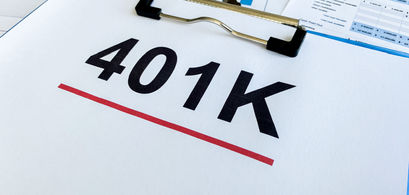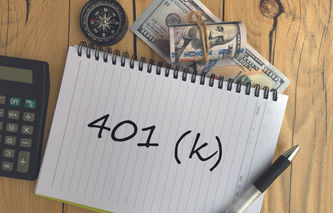Borrowing money from a 401(k) plan just got easier; the only thing needed is a 401(k) debit card. When a financial hardship occurs, it's a relief to know one can borrow from their account. But retirement savings are just that: money set aside that's intended to provide income once retired. These two points of view are at the heart of this debit card controversy.
In this article, we're going to discuss a topic that has some financial advisors in an uproar: 401(k) debit cards. We'll explain how companies are able to issue these cards, as well as the pros and cons associated with this kind of debt. Finally, we're going to run through the Internal Revenue Service rules individuals need to be aware of if they decide to use this type of card.
401(k) Debit Cards Explained
All 401(k) participants have the ability to borrow against their plan funds, and 20% of all employees take advantage of this opportunity. Where there is a demand for a service, a marketer is willing to help. That's how the concept of the 401(k) debit card came about; marketers supplying a service where buyers' demand exists.
Saving for Retirement
Most financial planners would agree that 401(k) plans are one of the best ways individuals can save for retirement. Employers typically match employee contributions to increase plan participation, and thereby provide employees with an instant return on their investment. At the extreme, companies have eliminated traditional pension plans due to the popularity, and convenience, of this "self-funding" retirement plan.
These same financial planners wince at the thought of employees borrowing against their future to pay for material goods today. These experts believe that 401(k) debit cards make it too easy to borrow money from accounts, arguing that certain individuals really don't understand the long-term implications of their actions.
Issuers of these cards claim that by providing easier access to money placed in a 401(k) plan, they are actually encouraging plan participation. If an employee believes they can access money in their plan in times of need, then they are more likely to place money into their accounts.
While the financial planning community and debit card issuers may not agree on the value of these cards, some of the less controversial pros and cons are summarized below.
Advantages of Debit Card
Applying for a 401(k) debit card is a simple process, providing easy access to account funds.
Most of the interest paid on the loan goes right back into the account.
Interest rates are usually very competitive for 401(k) debit cards when compared to credit cards. Of course, they will include a premium, or margin, which is one of the ways issuing companies profit from these offers.
Disadvantages of Debit Cards
Whether an individual is taking out a 401(k) loan, or using a debit card, one of the biggest drawbacks of a loan is the fact that many plans do not allow borrowers to contribute to their plan until the loan is completely repaid. If an employer matches 401(k) contributions, then the borrower is missing-out on some "free" money until the loan is repaid.
The interest rate or expenses paid on a 401(k) loan are not tax deductible.
The term of these loans, five years or 60 months, is relatively short when compared to alternatives such as personal loans.
401(k) Loans
The 401(k) debit card issuer is merely taking advantage of the fact that IRS rules allow for 401(k) loans. With this type of loan, accountholders are borrowing money from their plan and paying back the loan, principal, and interest over time. The most commonly accepted reasons for borrowing against a plan include:
College Tuition: money can be used to help pay for higher education / college tuition expenses for the accountholder, their spouse, or their children.
Home Mortgage: a loan can be used to prevent eviction from a home due to unpaid mortgage bills or possibly bankruptcy.
Medical Expense: in times of need, funds can be used to pay any un-reimbursed medical expenses that may have been incurred.
First Time Home Buyer: a first-time homebuyer can use the loan to make a down payment on a new home or residence.
Loan Rules
Plan administrators will know the specific repayment rules their employees need to be aware of before deciding to apply for a 401(k) debit card. Typical rules that would apply to this type of arrangement would include:
Length of Loan: normally the loan term would be five years (60 months) or less.
Loan Maximums: usually the lesser of 50% of the account balance or $50,000.
Program Fees: this may include program setup fees, maintenance fees, cash advance charges, and finance costs.
Interest Rates: 401(k) debit card issuers will charge cardholders an Annual Percentage Rate (APR) plus a margin.
Repayment: usually 401(k) loans are repaid through payroll deduction; however, repayment of debit card loans will be made through the issuing company via a monthly invoice.
There can be significant penalties and / or federal income tax consequences if the borrowed money is not placed back in the timeline required by the plan. For example, loans must be paid back in five years or less, and if the borrower fails to make payments on the debit card for three consecutive months, then the loan may be viewed as a distribution from the plan. When that occurs, income taxes may be due on the balance of the loan. Individuals less than 59 1/2 years old may also have to pay an additional 10% tax penalty.



